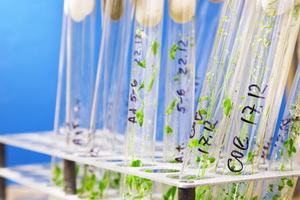
Nagoya University Develops Highly Efficient CRISPR-Cas9 Vector for Arabidopsis
June 7, 2017| |
 The CRISPR-Cas9 system has been widely used as a tool for genome engineering in various organisms. While some vectors for CRISPR-Cas9 in plants have been reported, there are still issues on low efficiency.
The CRISPR-Cas9 system has been widely used as a tool for genome engineering in various organisms. While some vectors for CRISPR-Cas9 in plants have been reported, there are still issues on low efficiency.
Hiroki Tsutsui and Tetsuya Higashiyama of Nagoya University in Japan developed a highly efficient CRISPR-Cas9 vector for Arabidopsis thaliana, the pKAMA-ITACHI Red (pKIR). The vector harbors the RIBOSOMAL PROTEIN S5 A (RPS5A) promoter, which drives the Cas9. The RPS5A promoter maintains high constitutive expression at all developmental stages starting from the egg cell and including meristematic cells.
Mutations induced by pKIR were carried in the germ cell line of the T1 generation. Further analysis of the T2 plants indicated that pKIR strongly induced heritable mutations. These results suggest that the pKIR system can be a powerful molecular tool for genome engineering in Arabidopsis.
For more information, read the article in Plant and Cell Physiology.
| |
Biotech Updates is a weekly newsletter of ISAAA, a not-for-profit organization. It is distributed for free to over 22,000 subscribers worldwide to inform them about the key developments in biosciences, especially in biotechnology. Your support will help us in our mission to feed the world with knowledge. You can help by donating as little as $10.
-
See more articles:
-
News from Around the World
- Report Shows 20 Years of Economic and Environmental Benefits from Biotech/GM Crops
- Public Learns about Biotech for Climate Smart Agriculture at World Environment Day Commemoration in Uganda
- Tanzanian Farmers Urge Gov't to Hasten Delivery of GE Crops
- Salk Scientists Help Plants Pump Iron Using Gene Variants
- Taking the Initial Step Towards Dev't of Epigenetically Modified Cotton
- Current Advances in Genome Editing Technology and its Application in Crop Improvement
- Australia's OGTR Receives License Application for Commercial Release of GM DHA Canola
- Australia's Gene Technology Regulator Shares Regulatory Practices with Vietnam
- India's National Academy of Agricultural Sciences Endorses Commercial Release of GM Mustard
- Scientists Discover Plant 'Brain' Controlling Seed Development
- EFSA Reiterates Previous Risk Assessment Conclusion on NK603 Valid and Applicable
-
Research Highlights
- SbNrat1 Gene in Sorghum Functions for Aluminum Tolerance
-
Announcements
- Biosafety in Plant Biotechnology Course
-
Plant
- Development of Gene-Specific Rice Mutants via AvrXa23-based TALENs
- Nagoya University Develops Highly Efficient CRISPR-Cas9 Vector for Arabidopsis
-
Read the latest: - Biotech Updates (April 24, 2024)
- Gene Editing Supplement (April 24, 2024)
- Gene Drive Supplement (February 22, 2023)
-
Subscribe to BU: - Share
- Tweet
